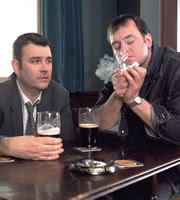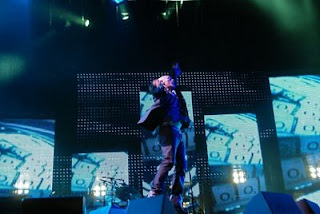Early Doors and the death of the traditional sitcom

They're currently repeating Early Doors on BBC4, Tuesday nights at 9:30pm, just before Mad Men, in fact. You'd be forgiven for not knowing the first thing about Early Doors, because unlike Mad Men it's a series that existed almost completely without hype.
Originally, 'Doors (as nobody calls it) was set to be Craig Cash and Caroline Aherne's follow-up to the multi-award-winning, insanely popular Royle Family, with the writing duo playing the landlord and landlady of a northern watering hole. That idea was scuppered when Aherne's well-documented "issues" got the better of her, and she buggered off to Australia and wrote a near-identical Aussie version of the Royles while she was there. Undeterred, Cash drafted in Phil Mealey as his new partner and carried on writing the new show, which can fairly be described as the Royle Family in a pub.
Perhaps BBC bigwigs perceived the show to be too derivative and lacking in star power after Aherne's departure, but for whatever reason Early Doors debuted very quietly in a 10pm weeknight slot. I don't remember a single trailer for it, which seem compulsory for every new show these days, but even so its gentle humour and beautifully-drawn characters proved popular enough with critics and fans for a second series to be made. Trust me, it really is worth checking out.
Watching 'Doors has really got me thinking about how the traditional sitcom has all but died out. By "traditional sitcom" I mean a half-hour comedy series filmed in front of an audience, with fixed cameras, a laughter track, a recognisable "sit" where the characters intersect, and a steady stream of jokes. Something like the Royles (and by extension 'Doors) is set up very differently - character rather than plot based, no obvious gags apart from ones which the characters consciously tell each other, and a near funereal pace.
In fact, Cash has said that he believes warmth is the most important thing in comedy, and it shows. One of the problems with the quickfire gag-based structure of traditional sitcoms it the somewhat cold and impersonal feel they can give you. Andrew Collins recently flagged up an episode of Not Going Out, the sitcom he co-writes with Lee Mack on his lovely blog. He was particularly proud of this episode and I gave it a go, but with all the will in the world I found it impossible to warm to the relentless gag-gag-gag format, which seemed terribly archaic. I was reminded of Frank Skinner discussing Jack Dee's Lead Balloon in Q last month, praising him for not making it so the other characters were constantly feeding him lines towards his own punchline. You only need to consider Skinner's own Shane to see what normally happens when stand-ups write their own shows (Shane's second series hasn't ever been aired, so just think how bad that must be). All I could think during NGO was that watching Lee Mack do stand-up would surely far more fun, with just the gags and no need for all that setup.
Lead Balloon takes its cues from Curb Your Enthusiasm and belongs to the modern strain of cringey, embarrassment-fuelled comedy series in which the chief protagonist is not necessarily all that likeable, and therefore find himself constantly humiliated for our edification. The Office is the king of the genre, its mockumentary twist on the format having spawned numerous inferior imitations. Along with the Royles, David Brent, Gareth et al are more responsible for the demise of the traditional sitcom than anybody else. Certainly Victoria Wood herself thought that the reason why her Dinnerladies wasn't watched by nearly as many viewers as her sketch shows was because Aherne and Cash had so utterly changed the sitcom landscape. Despite being regarded by the critics as an exemplary take on the traditional sitcom, Dinnerladies just seemed so curiously old-fashioned.
Maybe this is a natural evolution. Plus, American sitcoms are still as slick and well-crafted as ever, and there are still plenty of edgier Brit-coms such as the Boosh and Peep Show on the minority channels, which are all indebted to their old-fashioned ancestors however much they twist and tweak that format. It also seems that sketch shows have stepped in to fill the breach in the primetime schedules. At the same time though, if I watch Porridge, or Dad's Army, or Fools and Horses, I can't help feeling a twinge of sadness that such transcendent, universally loved comedy shows simply don't anymore. And with the fragmentation of the multichannel era and the rise of new platforms, you can't see anyone ever being able to write a new one.
RIP, the traditional sitcom. Gone, but not forgotten.



Comments